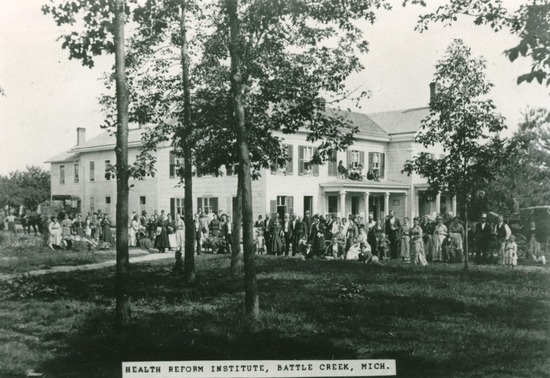Do Seventh-day Adventists Believe in Medical Care?
Adventists talk a lot about health principles and disease prevention. But how do we handle sickness and medical needs when they inevitably come along?
The Seventh-day Adventist Church believes in and supports evidence-based medical care. In fact, medicine has played a significant part in our history, and today we run a major health system with hospitals, medical schools, and clinics throughout the world.
Whole-person care is integral to our mission as a denomination.
For more on this, we’re going to look at:
Why Adventists believe in medical care
Adventists value a whole-person approach to health because we want to follow Jesus’ model of caring for physical, mental, and spiritual needs. From our beginnings, we’ve supported “scientific approaches to health care over pseudoscientific ones.”1 Our hospitals, medical schools, and clinics are a case in point.
A healthy lifestyle is the first line of defense in preserving health, but we also recognize the need for proper medical treatment. All members are free to seek out and choose the care that is best for their situation.
And this philosophy originates with Jesus.
Jesus cared for people’s physical, mental, and spiritual needs while on this earth. Healing was a significant part of that work. Matthew 4:23 tells us that:
“Jesus went about all Galilee, teaching in their synagogues, preaching the gospel of the kingdom, and healing all kinds of sickness and all kinds of disease among the people” (NKJV).
Meeting physical needs opened people’s hearts to receive the truths Jesus had for them.
Likewise, church members show the healing ministry of Jesus by meeting people’s physical needs. This is why we have 190 hospitals worldwide, plus clinics and medical schools such as Loma Linda University.
With that said, you may be wondering why, then, some might be confused about our stance on medical care.
Why would someone think Adventists don’t believe in medical care?
Despite the Adventist Church’s strong support of medical care, some people have concluded that we don’t believe in it. There are two reasons for this:
- Misunderstanding our focus on lifestyle and natural remedies
- Confusing us with other religions that don’t believe in medical care
Misunderstanding our focus on lifestyle and natural remedies
 Adventists talk a lot about our eight principles of health and well-being: nutrition, exercise, water, sunlight, temperance, air, rest, and trust in God. Indeed, God has provided many things in nature that are healing and beneficial.
Adventists talk a lot about our eight principles of health and well-being: nutrition, exercise, water, sunlight, temperance, air, rest, and trust in God. Indeed, God has provided many things in nature that are healing and beneficial.
Some, for instance, may opt to try certain herbal remedies or hydrotherapy (treatment with water) before going ahead with conventional treatment.
One common reason for doing so is to avoid the negative side effects of certain medications while also supporting the body’s natural processes of healing.
Others have had success with reversing chronic conditions, such as diabetes or hypertension, through a plant-based diet, exercise, and other lifestyle changes (while under the supervision of a doctor). In these situations, natural methods often work well alongside modern medicine.
Thus, this emphasis on natural methods doesn’t mean we discard conventional medical care or reject medical advice. Some individuals may do so, but the official stance of the Adventist Church has always supported people in getting proper medical care for their situations.
Confusing us with other denominations or religions that don’t believe in medical care
 Some religions, and even Christian denominations, have rules about medical care that people have misapplied to Adventists.
Some religions, and even Christian denominations, have rules about medical care that people have misapplied to Adventists.
For example:
Jehovah’s Witnesses don’t believe in taking blood transfusions.2 They see it as “a religious issue rather than a medical one.”
The Amish3 tend to rely on home remedies, even though their religion doesn’t forbid seeking medical care.
Christian Scientists believe in praying for healing and encourage their members to go to Christian Science practitioners rather than seeking traditional medical care.4
But as we’ve explored up to this point, none of these viewpoints reflect Seventh-day Adventist beliefs. We don’t discourage our members from seeking medical treatment.
But let’s look at a few cases in which Adventists might reject medical care, or certain types of treatments.
When would Adventists reject medical care?
 Adventists strongly believe that modern medicine has its place. We support medical care and the freedom to make choices in this area. But with the Bible as our foundation, many Adventists have moral and ethical convictions to avoid accepting treatment that would take life.
Adventists strongly believe that modern medicine has its place. We support medical care and the freedom to make choices in this area. But with the Bible as our foundation, many Adventists have moral and ethical convictions to avoid accepting treatment that would take life.
These kinds of things would include:
- Abortion
- Euthanasia, “mercy killings,” or assisted suicide
Our main reason for this is that we see life as a gift from God that begins at conception (Psalm 139:16; Jeremiah 1:5). He asks us to value that life (Exodus 20:13), so we don’t believe it is our prerogative to end it for medical reasons.
(Note: This does not necessarily apply in cases of patients with “Do Not Resuscitate” orders.)
In 2019, the General Conference of Seventh-day Adventists said the following in its official statement on abortion:
“The Seventh-day Adventist Church considers abortion out of harmony with God’s plan for human life. It affects the unborn, the mother, the father, immediate and extended family members, the church family, and society with long-term consequences for all. Believers aim to trust God and follow His will for them, knowing He has their best interests in mind.”
You can also find the following official statement about euthanasia:
“While Christian love may lead to the withholding or withdrawing of medical interventions that only increase suffering or prolong dying, Seventh-day Adventists do not practice ‘mercy killing’ or assist in suicide (Genesis 9:5, 6; Exodus 20:13; 23:7). They are opposed to active euthanasia, the intentional taking of the life of a suffering or dying person.”
These statements are not meant to point fingers, however. We don’t condemn those who have chosen to use one of these methods. We recognize these are difficult topics and approach all people with sensitivity and grace.
When it comes to other medical topics, such as vaccinations or birth control, Adventists have many different viewpoints.
Some individuals have strong reasons for not taking certain vaccinations or using birth control. Others have equally strong reasons for doing so. That’s why the Adventist Church supports the freedom to make decisions according to conscience.
Let’s take a moment now to understand how healthcare has developed throughout the history of Adventism, bringing us to where we’re at now.
Healthcare in the history of the Adventist Church
Since 1865, healthcare has been an important part of the Adventist mission. Ellen White, one of our founders, encouraged this movement and the development of health institutions.
Here’s how it started.
Our first health institution
Back in the mid-1800s, medical treatment was at a turning point. Many had bought into snake oil potions from “doctors” who, in reality, had very little training. Bloodletting, the use of mercury and arsenic (among other things) as medicine, and improper hygiene—all of these and more had made people skeptical of the medical profession.5
As a result, new and varied approaches were popping up. Some people began to explore the influence of lifestyle on health and disease.
During this time, the Holy Spirit impressed Ellen White with the importance of basic health principles, like proper nutrition (such as a vegetarian diet), exercise, sleep, etc. And in 1865, she advocated for the Church to start its own health institutions where it could teach these principles.

Courtesy of the Ellen G. White Estate, Inc.
Notice what she wrote:
“The Lord years ago gave me special light in regard to the establishment of a health institution where the sick could be treated on altogether different lines from those followed in any other institution in the world. It was to be founded and conducted upon Bible principles…and it was to be in His hands one of the most effective agencies for giving light to the world. It was God’s purpose that it should stand forth with scientific ability, with moral and spiritual power, and as a faithful sentinel of reform in all its bearings.”6
God wanted Adventist medical centers to not only reflect biblical principles but also “stand forth with scientific ability.”
When the first one—the Western Health Reform Institute (later the Battle Creek Sanitarium)—began in 1866, its care was far ahead of its time. It hired medical professionals—both doctors and nurses—to give natural treatments and teach principles that are now verified by science.
Later on, it became known as the Medical and Surgical Sanitarium and continued to use scientifically-based treatments.7
At its peak, many well-known individuals were treated there. Individuals like John D. Rockefeller, Henry Ford, Thomas Edison, William Howard Taft, Warren Harding, Calvin Coolidge, and the Roosevelts.8
The work at Battle Creek paved the way for other medical institutions in the Church.
Keeping up with medical advances
Ellen White herself was open to the scientific advances of her time, such as the smallpox vaccine, x-ray therapy, and blood transfusion.9 By the turn of the century, surgical procedures had greatly improved, and she supported their use. Here’s what she said about surgery:
“If there is need of a surgical operation, and the physician is willing to undertake the case, it is not a denial of faith to have the operation performed.”10
Through her own actions, this leader in Adventism encouraged church members to be pioneers in healthcare, eventually leading to the innovative medical establishments we have today.
A medical school and more hospitals

Courtesy of the Ellen G. White Estate, Inc.
In 1905, Adventists incorporated Loma Linda Sanitarium and opened its nursing school. It grew and expanded, so they built an 11-story building in 1967—which is still used today. In 1993, it added the Loma Linda University Children’s Hospital, providing a total of 900 beds for patients.
Today, Loma Linda University and Medical Center are on the cutting edge of technology and medical care. The university receives students from 80 countries and every state in the United States into its various programs—dentistry, medicine, nursing, pharmacy, public health, etc.
Other well-known medical institutions are Adventist HealthCare (Maryland), the Adventist Health network (west coast and Hawaii), AdventHealth (Florida), and Kettering Health (Ohio).
Adventists also continue to raise the standard of care in other countries. Loma Linda University Health has helped establish hospitals in places like Africa, Asia, and South America. And Adventist Mission has sent doctors and nurses to work in clinics and hospitals worldwide.
Adventists promote freedom of choice in medical care
Medical care and technology are invaluable in saving and preserving life. And as long as they’re used in this way, the Adventist Church stands behind their use. We support medical advancement and participate in it through our many medical institutions and professionals worldwide.
It’s one of the ways we show the love and care of Christ.
And for personal medical needs, Adventists have free choice in whether to seek care, and what kind to get—just like anyone else. God offers us freedom of choice, and we believe in offering the same to others.
- DuBose, Edwin R., ed., “The Seventh-day Adventist Tradition: Religious Beliefs and Healthcare Decisions,” Park Ridge Center for the Study of Health, Faith, and Ethics, 2002, p. 2. [↵]
- https://www.jw.org/en/jehovahs-witnesses/faq/jehovahs-witnesses-why-no-blood-transfusions/ [↵]
- https://groups.etown.edu/amishstudies/cultural-practices/health/ [↵]
- https://www.christianscience.com/press-room/questions-and-answers [↵]
- Robinson, Doris, The Story of Our Health Message (Southern Publishing Association, Nashville, TN, 1965), pp. 17–22. [↵]
- White, Ellen, Counsels on Health (Pacific Press, Mountain View, CA, 1923) p. 204. [↵]
- Gomide, Jonathan, “Battle Creek Sanitarium (1866–1942),” Encyclopedia of Seventh-day Adventists, Feb. 27, 2022. [↵]
- Ibid. [↵]
- Hirst, Albert, “Ellen White’s Attitude Toward Medical Progress,” Adventist Review, July 14, 1983.[↵]
- White, Ellen. Manuscript 67, 1899. [↵]
Related Articles
Questions about Adventists? Ask here!
Find answers to your questions about Seventh-day Adventists
More Answers
Why Many Seventh-day Adventists Choose a Vegetarian Diet
Why Many Seventh-day Adventists Choose a Vegetarian Diet?You may have an Adventist friend who is vegetarian, or maybe you’re attending a Seventh-day Adventist Church for the first time and notice the potluck doesn’t have any meat. This isn’t unusual in Adventism. In...
The Health Benefits of Fresh Air You Should Know About
The Health Benefits of Fresh Air You Should Know About“When you can’t breathe, nothing else matters,” the American Lung Association tells us. And while that’s true, the kind of air you’re breathing will determine the health benefits you experience. Breathing fresh...
What Do Seventh-day Adventists Choose to Eat?
What Do Seventh-day Adventists Choose to Eat?Food blogs overwhelm the internet; food fads are all the rage; and copycat and healthy versions of food are the subject of many a get-together. Eating—and eating the best way—is a big deal. And everybody has a different...
10 Incredible Ways Sunlight Can Improve Your Health
10 Incredible Ways Sunlight Can Improve Your HealthAre you concerned about sunlight’s negative effects? You might be the one who lathers on the sunscreen and covers up when you go outside. Or maybe you avoid being outside as much as possible. You might be surprised,...
Why Is Water So Important?
Why Is Water So Important?We all know that water is a substance we can’t live without. It quenches our thirst and keeps us hydrated on the inside. And it’s necessary for hygiene and cleansing on the outside too. But did you know that the cleansing properties of water...
Ellen White’s Writings and the Adventist Health Message
Seventh-day Adventists are known for their emphasis on healthy living. And Ellen G. White was a significant influence in the development of this priority and practice among Adventists.
Health Clinics
Ellen White and Adventist Healthcare—Ahead of Their Time Medical care in the mid-1800s was primitive, to say the least. Basic concepts we take for granted—such as proper handwashing or recognizing the dangers of bloodletting—were nonexistent. And doctors often had...
What Did Ellen White Teach about Vegetarianism?
What Did Ellen White Teach about Vegetarianism?One thing you might have heard about Seventh-day Adventists is their emphasis on a vegetarian lifestyle. If you’re wondering why that is, it goes back to our church’s humble beginnings: As Adventists studied the Bible,...
How Ellen White’s Teachings Can Improve Your Health
How Ellen White’s Teachings Can Improve Your Health Healthcare in the nineteenth century was said to leave “more disease than it took away” with its use of bloodletting and “medicines” like mercury and arsenic.1 As people questioned these methods, new approaches...
Change Your Perspective on Life with These 5 Mindsets
5 Biblical Mindsets to Change Your Life for the Better Sometimes, life is just plain hard. There’s no way around it. So would thinking about things differently really change anything? Our perspective on life, and everything it throws at us, affects more than we’re...
Bible Promises for When You’re Worried or Fearful
Bible Promises for When You’re Worried or Fearful The Bible is full of beautiful promises that can comfort us in a variety of situations. They can give us hope when we are hopeless, make us feel grateful for God’s love, and comfort us when we’re grieving or suffering....
12 Practical Ways to Overcome Worry
12 Practical Ways to Overcome Worry DISCLAIMER: This content is for informational purposes only. It does not constitute any professional medical advice and is not intended as a substitute for professional mental health therapy. It’s easy to get stuck in a cycle of...
How the Bible Talks About Worry, Fear, and Anxiety
How the Bible Talks About Worry, Fear, and Anxiety Worry and fear are the ingredients of anxiety. It’s easy to see how the world isn’t perfect—and the anticipation of a bad event or experience (that may or may not even happen) can end up draining the peace and...
How to Calm Anxious Thoughts, Using the Bible
How to Calm Anxious Thoughts, Using the Bible You were expecting a phone call from your daughter half an hour ago, and she still hasn’t called. She’s also not answering your calls. You feel your heart thumping as your thoughts race: What if she’s been in a car...
What You Should Know About the Adventist Health Studies
What You Should Know About the Adventist Health StudiesYou may have heard that Seventh-day Adventists care about health. But what you may not know is that Adventists have been the subjects of long-term research into lifestyle and health. Since 1958, researchers from...
Benefits of Sunlight
Yes, There Are Health Benefits of SunlightDespite the bad reputation it’s gotten, sunlight is generally associated with positivity, as shown by songs like “You Are My Sunshine,” or phrases that refer to delightful people as having a “sunny disposition.” There’s a...
Why Your Body Needs Rest for Optimal Health
Why Your Body Needs Rest for Optimal HealthStruggling to think straight? Wondering why you can’t remember that important tidbit you heard earlier today? Feeling like your emotions are about to explode? These are just some of the symptoms that can reveal your need for...
The Seventh-day Adventist Diet: One of Our Key Longevity Secrets
The Seventh-day Adventist Diet: One of Our Key Longevity SecretsOats, avocados, lentils, tofu—probably not what you first think of in a standard American diet. But if you show up at the home of an Adventist, chances are you may be served one of these staples. Out of a...
Why You Need Fresh Air
Why You Need Fresh Air“When you can’t breathe, nothing else matters,” the American Lung Association tells us. We couldn’t agree more! Breathing in clean air is an essential part of caring for our bodies, which God has given us. Together with other health principles,...
Sabbath Meal
Everything You Need to Know About Sabbath MealsFor Seventh-day Adventists, sharing a Sabbath meal with friends and family is one of the most special and memorable parts of the Sabbath. That’s why we want to share with you all about Sabbath meals and why they’re such a...
Adventists and Healthy Living
Adventists and Healthy LivingWhat’s the Adventist “Health Message” All About? One thing Seventh-day Adventists are known for is their emphasis on living healthy lives. Since our bodies are living temples of the Holy Spirit (1 Corinthians 6:19, 20), we strive to stay...
Water’s Importance—Physical Benefits and Spiritual Applications
Water’s Importance—Physical Benefits and Spiritual Applications We all know that water is a substance we can’t live without. Not only does it quench our thirst and keep us hydrated from the inside, but it’s necessary for hygiene and cleansing on the outside as well....
How Important is a “Day of Rest?”
How Important is a “Day of Rest?” Why God Created a Day for Downtime by Martin Casper Do you ever experience the feeling of complete overload? Do you feel like the only way you can get ahead is by slamming it 24/7? I hear these types of comments more and more...
7 Reasons Why a Day of Rest is Important
7 Reasons Why a Day of Rest is ImportantWe live in a fast-paced world. It seems as if success is measured in how much you can do in a short amount of time. (Extra points for the service or product that is available 24/7). The idea that we will be more successful if we...
How do Adventists choose what to eat?
How do Adventists choose what to eat?Every day, parents go through the ritual of getting their kids to eat what is healthy and good while trying to steer them away from what can hinder the growth of their developing bodies. Nutritionists work with their clients to...
How Can I Have a Better Marriage?
Is it possible to have a happy marriage?
Why are many Adventists Vegetarian?
Why are many Adventists Vegetarian?The diet intended for man is outlined in Genesis 1:29, “And God said, ‘See, I have given you every herb that yields seed which is on the face of all the earth, and every tree whose fruit yields seed; to you it shall be for food.’”...
Didn’t find your answer? Ask us!
We understand your concern of having questions but not knowing who to ask—we’ve felt it ourselves. When you’re ready to learn more about Adventists, send us a question! We know a thing or two about Adventists.























